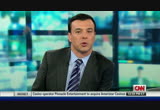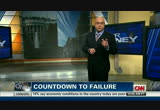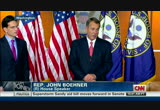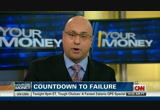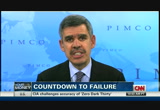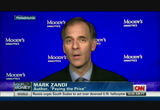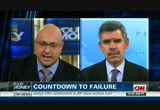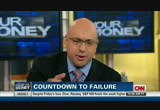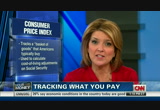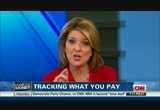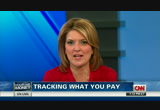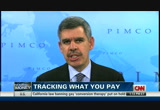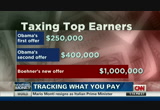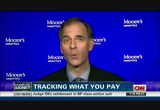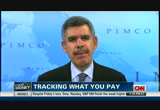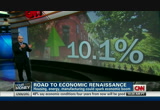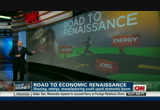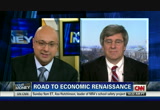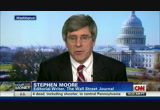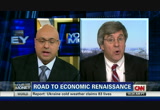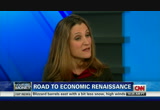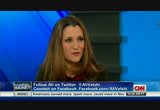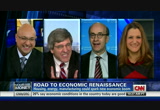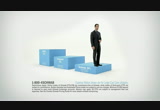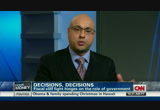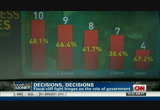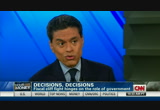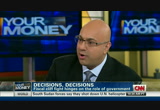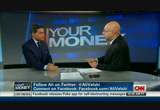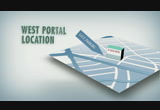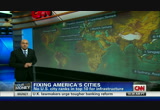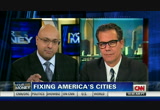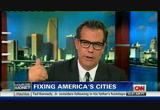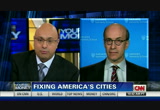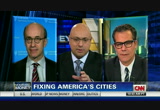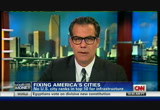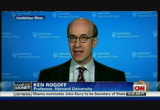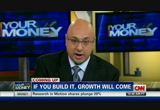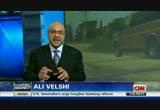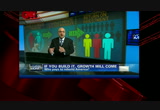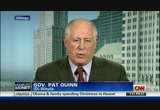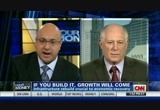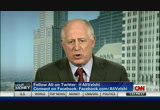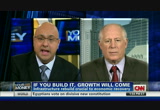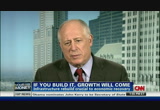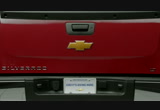tv Your Money CNN December 22, 2012 10:00am-11:00am PST
10:00 am
and family so the joy is spread around. very nice. i'll be back in an hour with much more news coming up after 2:00 p.m. one of the biggest gun retailers in america says it did a lot of soul searching after the newtown massacre. but in the end, customers wanted guns. in the 3:00 hour, we'll take a closer look at how other countries view america's fascination with guns including japan where almost no one owns firearms. and it's that time of the year when everyone gets sick. at 4:00 p.m., doctor sanjay gupta will explain how to avoid getting the flu. your money starts right now. just days to go before america goes over a fiscal cliff. an outcome looking more likely every hour. washington's willingness to take america to the brink threatens its prosperity. i'm ali velshi. this is "your money." the latest negotiations comes down to useless symbolic moves
10:01 am
and haggling between grown men. put bluntly, your elected officials are wasting time while the clock ticks. house speaker john boehner announced his plan b to let bush-era tax cuts expire for earners making more than a million dollars a year. and he wants to replace automatic cuts in defense spending set to start early next year with unspecified cuts elsewhere. the speaker pulled his so-called plan b for lack of support from his own party because many republicans still beholden to grover norquist and that ridiculous pledge want no compromise at all. the debate between the two sides centers around a balanced approach to the budget. republicans say president obama wants too much revenue. that's taxes in normal speak. and not enough cuts. >> at some point we have to address the spending problem we have. we can't cut our way to prosperity. we need real economic growth. many of us believe on both sides of the aisle the fundamental reform of our tax code will help us get your economy moving
10:02 am
faster and put more americans back to work. how we get there god only knows. >> president obama doesn't see it that way. >> at some point there's got to be i think a recognition on the part of my republican friends th that, you know, take the deal. they will be able to claim that they have worked with me over the last two years to reduce the deficit more than any other deficit reduction package. >> the ceo of pimco, one of the world's largest investors in bonds. mark standee is chief investor at moody's. and christine romans, host of "your bottom line." gdp, the broadest measure of the economy grew at an annual rate of 3.1% over the summer. we just got those numbers this
10:03 am
week. that's more than double the rate of previous quarter. you can see the chart there. it's been choppy but looks like we're going in the right direction. america's economy is gaining pace, doing better than expected. we've been saying that 2013 could be the year of a real economic renaissance in the united states or at least the beginning of one. so talk to me about the consequences to our prosperity if washington doesn't reach a deal. >> the consequences are not good. so what the numbers are telling you is that the private sector is healing. if it were left to its own devices it would heal faster. unfortunately, washington is getting in the way. what we found out this week, ali, is the problem is not just a lack of trust between democrats and republicans, we found out the republicans themselves can't unite, which means that the cooperative solution that you need to solve this country's headwinds becomes much more difficult, which means that the private sector will become more cautious, will hire less, will invest less, which
10:04 am
means that our economic growth will slow down and our unemployment rate will stop going down as fast. >> you know, we're just starting to get some traction here. we really want to keep this going. mark, let me ask you. the economy is doing belter than expected. no question. the revisions to a lot of numbers are looking better. housing is coming back. take a look at that. the median price of an existing home shot up 10% in november year over year. six months of home values going up in a row. a lot of americans build their wealth through their homes. higher home values means more confidence going towaforward. are you with this idea we're on the cusp of an economic comeback and that washington can do something to hurt that? >> yeah. i think economy is feeling good at year end, lot of good news on gdp, durable goods orders, and the housing numbers looking very good. we have some good momentum going into 2013 and i think the only thing standing in our way from a much better economy is a piece of legislation on our fiscal
10:05 am
issues. you're absolutely right. if policymakers can't nail this down reasonably sew -- so in the next few day, next couple weeks, they'll do a lot of economic damage and this good economic news is going to start to turn sour. >> christine, what's your thought? >> well, i mean, look, you keep hearing republicans talking about a more balanced approach, want spending cuts. but it's groundhog day in washington. only the movie was funny. this is not funny. we're going to go over the cliff here. politics are really the problem here and i don't see any progress at all from where we were more than a year ago, 18 months ago when we first got in this mess with the budget control act and raising the debt ceiling in the first place. i mean, do you agree with me, ali? we haven't seen any political progress here. >> right. and mohamed, let me ask you this. let's talk act the first piece of damage we may see, which we saw during the debt ceiling debate, the idea that the u.s. gets its credit rating hurt again. there's been some talk about it from fitch. the net result of lowering the
10:06 am
u.s.' credit rating the last time around and-in the debt debacle, it's kind of sad because the first experience most people have with that is it wasn't as bad as we were warned it was going to be. is there a real danger to the u.s.' debt rating and what could that mean? >> at some point, there was a danger. the reason why we haven't felt it is because we've been doing better than rest of the world. this concept that my colleague, bill gross says, wear the cle cleanest dirty shirt. so we're not clean but we're cleaner than europe is right now. >> right. >> so we haven't felt it. my main worry is the following, that if the republicans and democrats can't get together to solve the fiscal cliff you will need an external force, a major market sell-off, you will need a major economic trauma to get them to poex. >> other things have been on the table. i want to talk to our viewers about a few of those as soon as we come back. coming up next, republicans want a new formula for inflation.
10:07 am
it's called chained cpi. not a bad idea overall but it could slow the payments to social security recipients. the president has said he could agree to it but democrat lawmakers say no way. [ male announcer ] it's simple physics... a body at rest tends to stay at rest... while a body in motion tends to stay in motion.
10:08 am
staying active can actually ease arthritis symptoms. but if you have arthritis, staying active can be difficult. prescription celebrex can help relieve arthritis pain so your body can stay in motion. because just one 200mg celebrex a day can provide 24 hour relief for many with arthritis pain and inflammation. plus, in clinical studies, celebrex is proven to improve daily physical function so moving is easier. celebrex can be taken with or without food. and it's not a narcotic. you and your doctor should balance the benefits with the risks. all prescription nsaids, like celebrex, ibuprofen, naproxen, and meloxicam have the same cardiovascular warning. they all may increase the chance of heart attack or stroke, which can lead to death. this chance increases if you have heart disease or risk factors such as high blood pressure or when nsaids are taken for long periods. nsaids, including celebrex, increase the chance of serious skin or allergic reactions or stomach and intestine problems, such as bleeding and ulcers, which can occur without warning and may cause death. patients also taking aspirin and the elderly
10:09 am
are at increased risk for stomach bleeding and ulcers. do not take celebrex if you've had an asthma attack, hives, or other allergies to aspirin, nsaids or sulfonamides. get help right away if you have swelling of the face or throat, or trouble breathing. tell your doctor your medical history and find an arthritis treatment for you. visit celebrex.com and ask your doctor about celebrex. for a body in motion. visit celebrex.com and ask your doctor about celebrex. santho, ho, ho!anta! santa! want to see some magic? watch this! merry chr... (crash) ow! i landed on my keys. did you get that? oh yeah. that was amazing. here you go. that was a fun trick! see? santa's okay. walk it off santa. share videos instantly with s beam. on the galaxy siii and note ii. for a limited time get two flip covers for the price of one. exclusively at verizon.
10:10 am
so far the fiscal cliff debate has focused on tax tas, how much the 1% or 2% of americans will see their rates go up. tax hikes on the rich alone will not put all that much of a accident in the national deficit. you could take away every dollar from the top 1% earners and it wouldn't fill the gap. we heard earlier in the week about chained cpi, a suggestion john boehner made for his proposal. christine? >> chain cpi would change the way the federal government calculates inflation, which could stave federal government $300 billion over the next decade if implemented. the consumer price index measures how much they go up by tracking a basket of goods that americans typically buy. this is important because it's used to calculate cost of living adjustments and social security. checks pay a little more each year in line with inflation as calculated by that consumer price index. now, one potential flaw in the
10:11 am
system, consumer price index assumes people don't change their basket, if, say, the price of meat goes up. in other words, they don't switch from meat to chicken because the price of beef has gone up. they don't switch from, say, arugula to, i don't know, iceberg lettuce. it doesn't account for how behavior changes. chain consumer price index creates a chain basket of goods to measure inflation more accurately. it's measuring how people react to price changes not simply the fact that heiss pryces have changed. chained cpi could result in a slower rate of inflation over time, saves the government money on those cost of lifg adjustments and raising tax brackets on what people earn. why is chained cpi so vital to the fiscal cliff negotiation? it isn't a spending cut or a tax hike, but it would foifly cut spending and raise taxes on some, saving the government an estimated $300 billion over the next decade. but the problem is that what
10:12 am
that means is that senior, the longer they live, the less money they would actually take home. they would see a cut to their benefits. >> this was a concession from the democrats or was it just an accounting fix? >> it is both of those things. some democrats i spoke to said, look, maybe i would consider this, but only if we could have some sort of amerimechanism tha senior past age 85 would be facing a 6% or 8% cut in benefits, maybe there would be an adjustment to make sure especially for people who are very poor that there'd be some sort of safety net. you know, paul krugerman has said this is a horrible idea, terrible, stupid idea, and this is not something the white house should consider. >> let's bring back the rest of the panel. mohamed el-erian, ceo of pimco.
10:13 am
mark zandi with moody's. mohamed, when you say we're the cleanest dirty shirt, i wonder when it comes to negotiations where we are because we take unreasonable polarized positions. there are republican who is will not accept taxing the marginal income, you know, income above a million dollars and increasing that tax on the rich, and then you've got some democrat who is won't agree to this idea of chained cpi. bottom line, mohamed, they're going to have to be tough decisions. you cannot win budget concessions without tough decisions. when you're looking at how the united states solves its problems, what are the obvious ways? >> so the obvious way is to get together and recognize that you can only solve a long-term debt issues in the context of high growth. so you approach the fiscal problem in a way that makes sure that you also promote economic growth. so that has two implications. one is you can't do it all on one side. you can't do it all on
10:14 am
entitlements, nor can you do it all on revenues. you've got to move on both sides, which means political compromise. people don't like it, but that's the reality. second, fiscal reform that we need over the medium term has to be put in the context of a more comprehensive program that makes this economy grow faster and make it more productive. ali, what drives us crazy is that you can actually write this down. there are solutions to this. this is not europe. this is not greece. there are solutions. it's the politics that mess everything up. >> yeah. you're absolutely right. getting back to the issue of tax rates, it looked like we were getting closer. boehner offered to raise mate raitts for those making more than a million dollars a year, and the rate would only increase on the amount of money you earn over a million dollars a year. just raising those rates were a major concession for any republican. president obama, who insists on letting the bush tax cults expire for earns making more than $250,000, or at least that's how he presented it during the campaign, offered to let those taxes rise on those making more than $400,000 a
10:15 am
year. we're talking marginal rates then so, that would be only on income above $400,000. by the way, mark, $370,000 a year is what puts you into the top 1% here. you're an economist. all those income levels, 250, 400, a million, flying around for raising rates, what in your opinion is the breakoff point at which raising rates would substantially hurt the economy? >> well, i mean, i think coming to a compromise, as you point out the president's 400 k, speaker boehner was million. my guess is they come to an agreement somewhere around $500,000. if that's the break point in the tax increase, i don't think that does significant damage to the economy. i think it's very helpful to raise enough revenue to address the balance that mohamed was talking about. and i do think that the chained cpi is also a very good way to go. it addresses some of the concerns about the entitlement programs and spending. it's a reasonable thing to do. and it's also a part of that balance that we need.
10:16 am
so both those things -- you know, all these things are going to hurt. nobody really wants to do them, but we have to to address our fiscal problems. if you line up all the things we can do and say which is going to do the least damage, allowing the tax rates for income to rise two good things we should implement. >> let me ask mohamed this. people say you guys are making too much of a deal with this. nothing will happen on january 1st. actually if the payroll tax deduction doesn't come back, you'll get less money in your check. but that aside, is there a larger global market reaction that we're going to see, whether it's in bonlds or equities? >> well, we certainly aren't going to see a sell-off because i think the marks were convinced that our politicians would get their act together. so if we go over the cliff, look for risk assets to sell off. the kui, question, ali, is what happens in the rest of the world. there aren't very strong parts that can absorb the shock of
10:17 am
slower growth in the u.s. and that can become even stronger engines for both. china is slowing, europe is in recession. so the main concern -- and this is a risk scenario, what they call a left tail. it's not the baseline, is that we get a tipping process that one bad thing here leads to another bad thing elsewhere, which comes back here. and that's why the hope is somehow, somehow, i don't know how, but somehow in the next week washington will find a way to avoid this fiscal cliff. >> from your lips to god's ears, mohamed, thanks very much. coming up, as long as congress doesn't trip us up, we are on the way to an economic renaissance in this country. i'll explain.
10:18 am
ally bank. why they have a raise your rate cd. tonight our guest, thomas sargent. nobel laureate in economics and one of the most cited economists in the world. professor sargent, can you tell me what cd rates will be in two years? no. if he can't, no one can. that's why ally has a raise your rate cd. ally bank. your money needs an ally.
10:20 am
we are on the road to an economic renaissance. think about the united states economy like a runner along this road. full economic recovery and prosperity is the destination. the economy right now warming up with a nice jog, getting ready to break into a full sprint. gross domestic product, the broadest measure for the economy, grew by an annual rate of 3.1% over the summer. that's more than double the rate of the previous quarter. spending by americans was the single biggest factor in that growth. and more americans are spending their money to buy a home pushing prices upward across the country. the median price of an existing home shot up 10.1% in november year over year. we've seen home values rise six
10:21 am
months in a row as more americans get back to work and take advantage of those low mortgage rates. bottom line here, our runner, the u.s. economy, is just starting to break a sweat, and that runner should start to sprint soon as america begins to reap the rewards of its domestic energy boom. we are extracting record amounts of oil and gas from shale through fracking and other technologies. now, that is pushing prices for natural gas, which is used in part to generate electricity, down. that helps utilities and heavy industry compete, creating more jobs for americans. now, all of these things put together are sending my runner, the u.s. economy, dashing ever faster down that road toward an economic renaissance, one that offers real prosperity, real jobs for years to come. but running fast on this road requires something else, an investment in infrastructure. that's the subject of discussion i recently had with harvard professor ken rowback, "wall
10:22 am
street journal" editorial writer steve moore and chrystia free land. i asked ken how you convince lawmakers that infrastructure money is well spent and how do you ensure that the money is, in fact, well spent? >> i think you have to have firm regulatory oversight. it's not something you can just spend the money and walk away from. but there are the electricity grid, water, aging bridges. there's so many things hardening our cyber infrastructure against terrorist attacks and such. many, many things. elt doesn't have to be public money. there's no reason we have to be so statused about this that we can't have more private money. we have telephone companies, cable companies, we did the railroads that way. it doesn't all have to be public money. >> steven is nodding his head vigorously. you're going to disagree with the assertion that government can be helpful.
10:23 am
a new analogy. that government can be helpful other than by getting out of the way. i think you'll suggest lower taxes, lower spending, fewer regulations. but let's for the sake of this argument and this analogy accept taxes are going up for the rich. many conservatives argue there is not a role for government in this. let the markets and private industry handle it. but they haven't really and we've got substandard roads and bridges and electricity and broadband infrastructure. all of this means we're less attractive to business. do you accept that the government has a role to play in the rebuilding of america's infrastructure? >> well, sure. by the way, i love your optim m optimism, ali. i hope you're right about 2013 and 2014. we've been spending a lot of money on these programs, roads, bridges, a lot of the, you know, school building. that's been going on in a large magnitude in the united states. what i like, and where we might find some agreement, you know, i do think private sector dollars can lead to a lot of this
10:24 am
infrastructure. let me just mention one example. when you want to talk about infrastructure projects, what about the keystone pipeline? that's a perfect example of a major important and necessary infrastructure project that doesn't actually require a dime of federal money, yet it is being blocked. i like this idea -- for example on transportation roads. you talk about potholes and that extracts a cost on people. you know, in the state of indiana they actually sold their highways and now are being financed and operated by a private company. in california you actually have private roads, private toll roads that do very well. i like the idea. i think we've got to get it really very sophisticated about how we finance these things. used to be the gas tax financed roads. now we can use tolls. you get an easy pass, you can go anywhere in the country and tolls are a very efficient way of financing roads. >> the gas tax hasn't gone down. >> exactly. >> and consuming less gas so we have to find other ways. >> that's right.
10:25 am
>> i'm going to be talking to the governor of illinois about this, pat quinn, because they're building a lot of roads. chrystia, i think people underestimate the effect of fracking and natural gas in the united states and the lowering of the price of energy and what that does for heavy manufacturing, companies that use a lot of electricity. steven just talked about the keystone xl pipeline from alberta to take oil from the oil sands where you're from. i think that's probably going to happen. what's your sense of the royal of energy in helping my runner run fastener. >> well, to use your wonderful metaphor, i do run a bit and when i run road races there's this wonderful power gel you can take when you start flagging after the first hour or so. energy is going to be like that power gel for the u.s. economy. i agree, people are underestimating it, and it's going to have a fantastic impact. think about all the time we are spending arguing in the united states about taxes. energy is a tax on -- energy prices are a tax on everyone. >> right. >> they're a tax on households, on business ls.
10:26 am
and we are going to see much more available cheaper energy and that will lower the burden on households and crucially, as you pointed out -- and this is where i think you're going to see a knock-on effect, it makes manufacturing more viable in the u.s. so it's not just the jobs in the energy sector. it's the fact that all of them, especially natural gas, which is hard to transport, it starts to make sense to locate those factory where is that energy is. p other thing that i love about the energy is story is, as we've discussed a lot, one of my huge concerns about the u.s. economy is well-paying middle-class jobs. and i think that, you know, we can't neglect the economic reality that we are seeing the hollowing out of those jobs, huge downward pressure on wages. >> right. >> in the energy sector, that's not happening so much because in the actual production of natural resources you can't outsource those jobs. those are good jobs. >> can i give you an example of what she's talking about? i was in north dakota a few months ago. that's where the epicenter of
10:27 am
this energy boom that she's talking about is going on. amazing. if you fly over some of these little towns in north dakota, they light up at night like a christmas tree. i asked what's going on. what they're doing is burning off the natural gas because they want the heavy oil, because that's more valuable. i asked why are you burning off the natural gas? they said we done have the pipelines yet to get that natural gas to the market. that's a perfect example of the kind of infrastructure that we need. i want to mention one other quick thing. when you talk about -- you know, ken mentioned telephone service in this country. that was mostly built actually with private dollars, not public dollars. >> with a lot of regulation, though. >> that's true. but i ges i'm saying -- i think the thing we can all agree on, if we're going to have the infrastructure we need, we need private sector dollars to do it. >> you did cite the example of something that did involve government. >> yes, but it was most private dollars. >> but some government involved. >> you're caught, steven. admit it. ali got you.
10:28 am
>> no. this is a case we need the private sector to take it on. >> and with a little government help. great to see you all. coming up, you just heard us talk about this. do you want better roads and bridges? how about a smarter electric grid? maybe you do, but are you willing to pay higher taxes for them? tdd#: 1-800-345-2550 let's talk about low-cost investing. tdd#: 1-800-345-2550 at schwab, we're committed to offering you tdd#: 1-800-345-2550 low-cost investment options-- tdd#: 1-800-345-2550 like our exchange traded funds, or etfs tdd#: 1-800-345-2550 which now have the lowest tdd#: 1-800-345-2550 operating expenses tdd#: 1-800-345-2550 in their respective tdd#: 1-800-345-2550 lipper categories. tdd#: 1-800-345-2550 lower than spdr tdd#: 1-800-345-2550 tdd#: 1-800-345-2550 and even lower than vanguard. tdd#: 1-800-345-2550 tdd#: 1-800-345-2550 that means with schwab, tdd#: 1-800-345-2550 your portfolio has tdd#: 1-800-345-2550 a better chance to grow. tdd#: 1-800-345-2550 and you can trade all our etfs online, tdd#: 1-800-345-2550 commission-free, from your schwab account. tdd#: 1-800-345-2550 tdd#: 1-800-345-2550 so let's talk about saving money, tdd#: 1-800-345-2550 with schwab etfs. tdd#: 1-800-345-2550 schwab etfs now have the lowest operating expenses tdd#: 1-800-345-2550 in their respective lipper categories. tdd#: 1-800-345-2550 call 1-800-4schwab tdd#: 1-800-345-2550 or visit schwab.com tdd#: 1-800-345-2550 to open an account today.
10:29 am
tdd#: 1-800-345-2550 funding is easy tdd#: 1-800-345-2550 with schwab mobile deposit. tdd#: 1-800-345-2550 investors should consider tdd#: 1-800-345-2550 carefully information d#: 1-800-345-2550 contained in the prospectus, d#: 1-800-345-2550 cluding investment objectives, d#: 1-800-345-2550 risks, charges, and expenses. d#: 1-800-345-2550 you can obtain d#: 1-800-345-2550 a prospectus by visiting tdd#: 1-800-345-2550 w.schwab.com/schwabetfs. please read the prospectus tdd#: 1-800-345-2550 carefully before investing. tdd#: 1-800-345-2550 i have a cold, and i took nyquil, but i'm still "stubbed" up. [ male announcer ] truth is, nyquil doesn't unstuff your nose. what? [ male announcer ] it doesn't have a decongestant. no way. [ male announcer ] sorry. alka-seltzer plus fights your worst cold symptoms plus has a fast acting decongestant to relieve your stuffy nose. [ sighs ] thanks! [ male announcer ] you're welcome. that's the cold truth! [ male announcer ] alka-seltzer plus. ♪ oh what a relief it is! ♪ [ male announcer ] to learn more about the cold truth and save $1 visit alka-seltzer on facebook. i'm going to dream about that steak. i'm going to dream about that tiramisu. what a night, huh? but, um, can the test drive be over now?
10:30 am
head back to the dealership? [ male announcer ] it's practically yours. but we still need your signature. volkswagen sign then drive is back. and it's never been easier to get a passat. that's the power of german engineering. get $0 down, $0 due at signing, $0 deposit, and $0 first month's payment on any new volkswagen. visit vwdealer.com today. if you're still listening to president obama and house speaker john boehner you'd be
10:31 am
thinking the fiscal cliff fight is about taxes. >> unless the president and congress take action, taxz rates will go up on every american taxpayer. >> if the argument is that they can't do -- they can't increase tax rates on folks making $700,000 or $800,000 a year, that's not a persuasive argue tomt me and certainly not to the american people. >> so here is the rub. the discussion centers on whether or not to let the top income tax rate jump from 35% to 39.6% on the marginal part, the part above the number, let's call it $400,000. but john boehner says don't give the government more revenue because it already spends altogether too much. now, the question is not really about that 4.6% difference on what the rich will pay in taxes. the real conversation boils down to the role of government. generally speaking, democrats are willing to entertain a
10:32 am
bigger role of government in society. republicans want to roll it back. it's ideology. but a more constructive conversation would be how much do we expect to benefit from the services the government provides for us and how much are we willing to pay for those services in exchange? that got me thinking, here's a list of countries rateeds on a scale of 1 to 10 on light satisfaction. denmark tops the list at 10. my home, canada, comes in at 9. the u.s. comes in at an 8, france 7, and japan is a 4. let's compare that satisfaction to the average marginal tax rates people pay in those countries. americans pay on average 4 41.7 when you factor in federal, state, and local taxes. the danes pay more, 48.1%. how come they're happier? because it pays for free education, post secondary, canadi canadians, by the way, pay more than the u.s., as well, 46.4% in taxes.
10:33 am
why are they happier? because their taxes pay for universal health care. the french pay fewer taxes than americans do and are less happy. we don't know why that happens. the japanese make sense. higher taxes, 47.2%, and they are less satisfied with what they end up with. fareed zakaria is the host of "fareed zakaria: gps." he's got a special on sunday at 8:00 p.m. and 11:00 p.m. eastern titled "tough decisions." i asked him, are american taxpayers getting their money's worth? >> imagine a guy in germany. probably he pays, particular pi upper middle class or upper class, probably pays more in total taxes than his american counterpart, though it's not xwirly clear once you add value-added tax consumption. >> good point. >> but here's what he gets in return. he gets universal health care, high quality, he gets a free education from kindergarten through any master's, bachelor's, ph.d. program he wants and it's pretty high quality as well. he gets free retraining if he
10:34 am
ever loses his job. he gets all the benefits like daycare and stuff that europe is famous for. and the president of the united states may be a couple percentage points lower but he has to save for health care and long-term care when he gets old, has to save for his children's college education, perhaps for high school education, and certainly for any amount of retraining he may need. so, you know, it's not entirely clear that europeans have such a bad deal. >> so the question here, and this is why this is relevant to your tough decisions though, is is it is a tough decision. we are deciding that we want less government. right? so the idea of whether you pay 35% or 39.6% as your marginal top tax rate is really code for at 35 or lower i get less government. grover norquist, who is leading this charge for no tax increase, says i want to drown government in the bathtub. >> here's the problem with that. americans like government. what we have for the last 30 years done is say we're going to
10:35 am
have low taxes but we still wants lots of government and we made up that difference by borrowing. and i think there's one part of what john boehner says, which is quite right. you can't keep doing this forever. at some point you've got to get that straightened out. the problem is the republicans realize that large growth of government is pretty popular. that's why they don't identify specific cuts p. >> right. they say we'll cut this amount of money but nobody will tell you where they'll cut. the low-hanging fruit is gone. >> the only place you could find something is, again, it gets to the role of government, the more interesting discussion, which is the p you hut health care costs by saying we're going to improve quality but reduce costs. you can do that, but you're going to have to have panels, they call them death panels or whatever you want, but panels that say, look, this stuff is not worth it. we're not going to reimburse you. this long-term care is not worth it. they're going to have to be judgments made and that's a role for government that americans are very uncomfortable with.
10:36 am
that is government deciding what health care you get. but that's how the europeans and the taiwanese and all these guys do health care at half the cost we do with better result. >> all right. this sunday at p.m. eastern, catch fareed zakaria's new special "tough decisions" from the raid on bin laden to henry kissinger's role in opening china to the west. a look at how top leaders make tough decisions. sunday night, 8:00 p.m. eastern. rib-shattering potholes, decaying bridges, electrical systems that haven't been upgraded since the 1950s. we're not talking about cuba or india. we're talking about america, which earns a "d" grade from civil engineers for its infrastructure. there are ways to fix them that create real jobs. wait...you relieve nasal congestion? sure don't you? [ nyquil bottle ] dude! [ female announcer ] tylenol® cold multi-symptom nighttime relieves nasal congestion. nyquil® cold and flu doesn't. can i still ship a gift in time for christmas? yeah, sure you can. great.
10:37 am
where's your gift? uh... whew. [ male announcer ] break from the holiday stress. ship fedex express by december 22nd for christmas delivery. by december 22nd santho, ho, ho!anta! santa! want to see some magic? watch this! merry chr... (crash) ow! i landed on my keys. did you get that? oh yeah. that was amazing. here you go. that was a fun trick!
10:38 am
10:39 am
10:40 am
dallas at number 15, washington, d.c., at number 22. in the world. the richest country in the world doesn't make the top ten in terms of sitting infrastructure. this is from mercer, by the way, the survey. it ranks cities based on electricity and water infrastructure, congestion, public transportation and airport effectiveness, which is probably what got some of these american cities onto the list in the first place. but americans shouldn't be surprised. china spends about 9% of its total economic output on infrastructure. europe spends about 5%. 50 years ago by the way the u.s. spent about 5%, but now we spend half as much at 2.4%. richard florida is a professor at nyu and the university of toronto as well as the senior editor at the atlantic. richard, u.s. cities have a problem. but i just sort of made it look like it was a spending problem, that china spends more, europe spends more. is it a spending problem? >> well, you know, u.s. cities are the great strength of the
10:41 am
american economy's comeback. when you look at all the studies thachb done, studies our research group has done, ed glazier at harvard, cities are a key part of our productivity and advantage. but clearly we have lagged at infrastructure spending. according to some reports we need to spend about another $2 trillion just to get up to par, get that up from 2.5% to 5%. one of the things so important in the critical book on systemic crises and how they play out, one of the things we found in looking at that work in an urban context is the key to recovery is not just government spending. it's not just a keynesian demand-side spending or stimulus, it's the creation of new urban infrastructure. it powered the recovery from the great crises of the last 19th century by building electric grids and sue sewer systems and cable cars. it powered our recovery from the
10:42 am
great depression by building that suburban interstate highway network. now with cities being the key, density being the central part of our productivity and innovation gain, we have to investigate in public transit, high-speed rail, invest in infrastructure in cities. >> what a great intro to ken, who's back with us. you're in this discussion because you have said all these things that richard says. you say infrastructure is key to economic growth and cities are key to the economy. let me give you some of the figures. large cities produce 83% of economic output in the united states. the 30 largest cities in the u.s. account for half of all gdp. now, we're all in favor of good infrastructure until it comes time to pay for it. you say that some money can come from the private sector, but we've had some high-profile examples of public/private partnerships that have gone wrong. how do city governments make sure that city residents get what they pay for? >> i don't think there's any simple answer to this. and by the way, one reason when he we might want a national
10:43 am
infrastructure bank is not for the money but just to provide oversight and ombudsman so that you have somebody to go to when off project or regulator, an interlocutor perhaps. we should definitely allow private money. there is an additional problem, and richard probably knows more about this, about so-called eminent domain, where you can't just clear things out. in china, they used to at least just knock on your door and say you're moving, we're building here a road here. you have to move out of your parm tomorrow. we can't do that. so it makes it trickier to rebuild. >> interesting analogy because i spent time in china and india in this last year and everybody talks about china, india, you can't move people out at all. there are lawsuits. >> absolutely. >> democracies have a little more problem with these massive infrastructure builds. another issue we want to talk about, richard, you say the u.s. has focused too much on car infrastructure. that made sense at a certain
10:44 am
time. americans are shifting to public transit, taking $10.4 billion trips on public transit last year, 2012, is expected to exceed that. and part of the problem here is public transit investment and infrastructure. >> well, we're up on public transit trips as you said. we're up on light rail trips, another 2%. up about 5% on public transit trips. and moreover, those people who are located near public transit and near subway systems and light rail, they've seen their housing prices go up the most. that's what people are desiring. one of the things i'd like to see is obviously we're not going to give up on the suburbs and the exurbs, or give up on the car but use the darn car. the tolls. make sure congested cities like new york, like london has, have congestion pricing so it's not a free good. make people who use the car pay for it and tilt the balance of our infrastructure funding using some of those funds to rebuild our public transit
10:45 am
infrastructure. as you know, i've traveled into new york all the time and travel into canada all the time. my wife always reminds me to difference of traveling into pearson airport versus the new york, our greatest city in the world, airports. we've got to put a little more money. we know airplanes according to a whole range of recent studies are big economic generators. act on the same plane as our high-tech industry clusters. we need to rebuild our airports, invest in our public transit as well as keeping our roads going. but let's pay for the roads. >> ken, i see you nodding. do you think there are some things that rank higher than other things or should this be done as a portfolio, that there are a lot of things that need to be fixed? richard made a reference to the $2 trillion number to get our infrastructure on a national level up to a reliable point. >> well, i want to pick up first on this idea of pricing things and congestion pricing, which people just in the united states haven't accepted. so if it's a really busy road, you pay more to use that road. that used to be impossible.
10:46 am
i mean, you couldn't put a tollbooth every two miles. now it's nothing. it's easy to achieve that. that would make a huge difference in making it more efficient. and i certainly agree strongly with richard that we emphasize the car way too much. we are past that. the cities are at the core of our development. they're probably at the core of our future for a long time. we need to improve public transport. you can't just stuff more and more cars into the cities, which we're trying to do. you can see that everywhere. >> all right. great conversation, guys. thanks very much for joining me. ken, professor at harvard university, richard florida, professor at the university of toronto and new york university. both have excellent books you should be reading to get smarter on these topics. we are on the road, to use that analogy, to an economic renaissance. but to get there we need real roads and railways and water and energy systems. are you still not convinced after all this? if you're still worried about who pays the bill as opposed to who benefits, stick around.
10:47 am
i'll show you the state with the blueprint for exactly how we are going to rebuild america. and cut! very good. people are always asking me how we make these geico adverts. so we're taking you behind the scenes. this coffee cup, for example, is computer animated. it's not real. geico's customer satisfaction is quite real though. this computer-animated coffee tastes dreadful. geico. 15 minutes could save you 15 % or more on car insurance. someone get me a latte will ya, please?
10:50 am
there are many different ways for this collaboration to work but in an ideal world it would look like this. say upped to build a new highway for instance. you used some public capital, state government money, and attract private capital either through an infrastructure bank which we've discussed here or by issuing bonds for the project. there's big money waiting in the private sector to get the steady long-term returns that infrastructure investments provide. so that's how you get the money. then the government enlists a private company to construct and operate the highway. once it's up and running they charge fees to use the highway. you'll know that as tolls. the money generated at the toll booth generates money for the public, governments and private investors. this, would with any
10:51 am
infrastructure that has user feeses, waterways, electric and gas grids, broadband systems, the list is endless. governor patrick quinn has made historic investments in infrastructure. thank you for being with us. your illinois plan now put $31 billion of capital to invest in infrastructure and public/private partnerships. you created initiative to expand broadband networks statewide as example. tell our viewers what role government played and the private sector played to make this work. >> we're still going. we added $12 billion with our tollway system, ali, and you mentioned about the public/private partnerships. bare very interested in that with respect to our roads and also or our broadband deployment. we have 4100 miles of broadband. we're laying fiber across illinois. we've done over 7,000 miles of roads, over 1,000 bridges.
10:52 am
we like to build buildings as well, school buildings. anytime we can tract private interests, we're always interested in that. we understand that the government does have to put some money on the table. that's what we're doing, and you know, there are opportunities for private investors. we passed a law in illinois for public splash/private partnerships and want to build a new airport south of the metropolitan area of chicago. >> airports are the one thing we do in america that people get when it comes to the partnerships. there's always criticism of this, criticism that the governments don't have money, there are criticisms that governments don't make the rht decisions. the city of chicago famously struggled with its public/private partnership on its parking meters in 2008. the city leased its system to a group of private investigators. they did a poor job of managing the transition. there were steep rate hikes and confusion and it resulted in the downgrade of the city's credit rating. i know that's not one of your projects.
10:53 am
>> no, that's right. >> what are the lessons of that type of thing for your own initiatives? >> you got to be very careful. you know, the city also did one with the skyway, a bridge across from chicago to indiana. that was done in a better fashion. if it's not carefully done, it can really backfire. so that's why we take each step and do it in a very reasonable sound way. we're embarking on this. this is brand new for our state of illinois. we do see, for example, the federal gas tax not just being able to finance the kind of infrastructure and highway and bridge improvement and expansion we've had over the last half century. the federal gas tax is declining. with fuel economy in our vehicles and we want that, we're just not going to have the revenues from the gas tax to bid the roads and repair the roads we need for the future. so we do have to look for these new ways of financing important matters that create jobs today. a lot of construction jobs are
10:54 am
created. at the same time they lay the foundation for economic growth for decades to come. so investing in things like roads, bridges, rail systems, we're doing high speed rail from chicago to st. louis. we'd like to do high speed rail super high speed rail from chicago to champaign on top st. louis and indianapolis. that's going to require private investment if we're going to get the job done. >> i was over in china. it was one of the most impressive things about the place, high speed rail cutting travel time. of the cities with the best infrastructure in the world, more than half of them are in europe. take a look where public private participantships are happening. part of the reasons we're not seeing many of these in the united states is that the legislative structure for them only exists in 31 states. in your states, there are several large scale roadway projects you've been talking about. illinois has been looking at for a long time getting involved in. when you do prong projects like
10:55 am
there are always accusations that it's pork and favors to everyone. where do you decide where they need to go? >> it's a matter with the legislature. elected representatives have their priorities. we have a five-year plan in illinois for our highway system, and also a plan for our toll way system. we tell people ahead of time what the priorities are and people work together with us in the executive branch. when we're building a bridge across the mississippi river as we're doing right now near east st. louis, that's something that everybody understands. there's a bridge in minneapolis that fell in to the river. we don't want that to happen anywhere in our country and certainly not in our state. we want to work together with people on something as big as a bridge that might take six years to build. we also need to build a bridge near the quad city airport, rock island and mo lean, build a bridge across the mississippi to iowa there. >> my friend christine romans will be very happy to hear that you guys are building a bridge
10:56 am
to the quad cities. great to see you. >> we're bridge builders. >> thank you, governor quinn. i've given you my take on infrastructure and the fiscal cliff. why are you listening to me? milleninials are the future and have remarkable answers to change the way you think about work and life. i'll tell you about it on the other side. you're watching "your money." welcome to chevy's year-end event. so, the 5.3-liter v8 silverado can tow up to 9,600 pounds? 315 horsepower. what's that in reindeer-power? [ laughs ] [ pencil scratches ] [ male announcer ] chevy's giving more. get the best offer of the year -- 0% apr financing for 60 months plus $1,000 holiday bonus cash. plus trade up for an additional $1,000 trade-in allowance. hurry. bonus cash ends january 2nd.
10:57 am
10:58 am
10:59 am
discussion on millennials, those born after 1981, and i discovered that those of us with gray or no hair can learn a good deal from generation y as they're called. seismic economic shifts in an era of permanent freelancing, disruptive technology and nonstop globalization mean that the job security that older generations were accustomed to is now gone. according to department of labor, the average worker now stays at his or her job for just 4.6 years. so you've got to be flexible to survive. second, you'll need more training. these kids are the most educated bunch in history and they will assume that they need more education in the fij. this economy handed milleninial lemons so they're acquiring skills to make career lemonade. if you're lucky enough to have a job right now, focus on what you get out of the experience more than what you get from the job itself. many young colleagues don't expect to stick around long enough to climb the ladder that more seasoned workers had
199 Views
Uploaded by TV Archive on

 Live Music Archive
Live Music Archive Librivox Free Audio
Librivox Free Audio Metropolitan Museum
Metropolitan Museum Cleveland Museum of Art
Cleveland Museum of Art Internet Arcade
Internet Arcade Console Living Room
Console Living Room Books to Borrow
Books to Borrow Open Library
Open Library TV News
TV News Understanding 9/11
Understanding 9/11